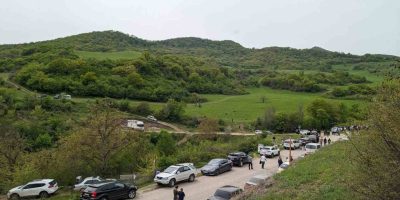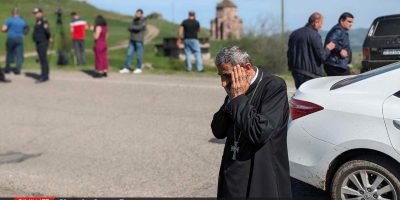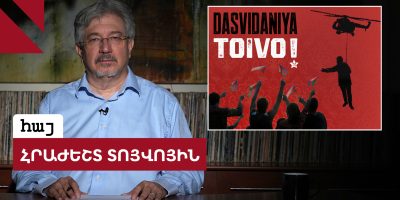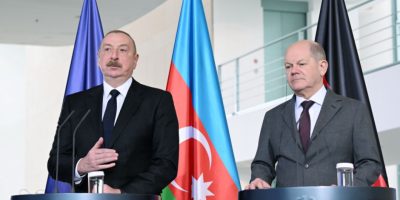 Today, as thousands of Armenian citizens are gathering at the Freedom square in Yerevan to protest against election fraud, Amnesty International is calling the Armenian authorities to investigate election related human rights violations.
Today, as thousands of Armenian citizens are gathering at the Freedom square in Yerevan to protest against election fraud, Amnesty International is calling the Armenian authorities to investigate election related human rights violations.
International intergovernmental observers’ generally positive assessment of Armenia’s 18 February Presidential Election and the preceding campaign season should not be interpreted by Yerevan as to ignore reports of human rights violations related to elections.
Amnesty International has received several reports of harassment including allegations of intimidation and use of force against voters and observers and is concerned that in some cases the Armenian authorities have failed to provide adequate protection and conduct prompt and adequate investigation into violations.
A non-governmental international observer, Narine Esmaeili, stationed in polling station 17-5 in the town of Artashat during the 18 February Armenian Presidential election was physically assaulted and threatened by the polling station officials when protesting over alleged election violations. Narine Esmaeili reported that she had witnessed the group of 25-30 men walking into the station, surrounding the ballot box. The police officer guarding the station had ignored her request not to allow more than 15 persons to enter the polling station as it was in violation of voting rules. When she tried to protest, one of the men from the group pushed her against the wall and held her up with her hand pressed against each other, while polling station official cut open the ballot box seal to allow one of the men from the group to pour the bag full of ballots. The local police officers, who arrived at the scene later responding to her phone call, told Narine Esmaeili to be to be a “good girl” and not talk to the media instead of registering and investigating the allegations.
Several other journalists also reported to have been threatened and prevented from carrying out their journalistic duties on the elections day:
Journalists from the newspapers Aravot.am and Asparez.am reported that they were threatened to have their “necks cut” if they attempted to film the violations at the polling station in the city of Gyumri. They had spotted a particular vehicle parked outside polling station 35/22 in Gyumri. An unidentified individual in the car reportedly threatened the journalists, saying “try and videotape us. Who the hell are you to videotape us? Why are you here? I will cut your throat.” The journalists also reported that the individual in the car subsequently followed them while they remained in the vicinity of the polling station (approximately 1.5 hours).
Two other female journalists Marine Kharatian from 1in.am and Gayane Saribekian Hraparak daily correspondent were reportedly attacked by a group of men outside a Yerevan campaign office of the incumbent president Serzh Sargsyan. The assailants cursed at the journalists, seized their video cameras and prevented them from entering campaign headquarters.
There was also a reported threat against civil activist Tsovinar Nazaryan who tried to film an irregularity at the polling station at 17/4 in the town of Artashat. The polling station official requested her to be forcibly removed from the polling station, threatening that otherwise he “will kill her”. Tsovinar Nazaryan’s partner Tatevik Barseghyan was reportedly warned by the newly-arrived head of the Territorial Electoral Commission (TEC), that if the two women angered polling station officials, he would not be responsible for any violence committed against them. Tsovinar Nazaryan filed a complaint about the death threat against her with the TEC, which rejected the application.
An Armenian watchdog project iDitord (by Media Diversity Institute, using Ushahidi open source tool) has compiled nearly 400 irregularities, some of which are instances of threats and violence as well as pressure by local officials.
According to reports from combined sources, voters in the following villages were allegedly forced to expose their ballots to prove that they had voted for the incumbent before dropping them into the ballot box: Aghbyuradzor, Avshar, Chochkan, Kharberd, Mantash, Nazrvan, Norakert, Ohanyan, Torfavan, Vanevan, Verin Getashen, and Zovun. While Amnesty International has not been able to verify these allegations or estimate an approximate percentage of voters in these communities who were forced into voting against their will, many local NGOs claim that such pressure and threats were widespread.
Residents of Yeghiapatrus village were reportedly threatened by the local administrator (village head) to vote for President Serzh Sargsyan, or otherwise face having their welfare benefits cut. In Pokr Mantash, the local head and his brothers reportedly didn’t even let residents fill out the ballot and allegedly voted on their behalf.
Several media outlets, including BBC Monitoring also reported that the website of the independent GALA TV (galatv.am, Gyumri) in Guymri, which was reporting on violations on 18 February, the day of the elections, became during inaccessible for the second half of the day after being subjected to an anonymous denial-of-service attack (DoS attack).
The public defender of Armenia issued a statement on 19 February expressing concern regarding the failure of the police to respond adequately to election related violations including the cases of obstruction of the work of the journalist and the independent media.
Armenian authorities must ensure that journalists are able to operate without threats and harassment and that citizens can exercise their political rights without being subjected to human rights violations. Amnesty International calls on the relevant authorities to carry out prompt and impartial investigations into all allegations of rights violations during the elections and hold those responsible to account. The authorities must also guarantee the safety of participants at post-election protests and public meetings.
Background
In elections characterized by international observers as lacking competition and public trust in the electoral process, Armenian president Serzh Sargsyan claimed victory with 59 percent of the vote. His main challenger, Raffi Hovannisian of the Heritage party came second with almost 37 percent.
On 19 February, Hovannisian’s Heritage party rejected the official results declaring victory and alleging the government of committing electoral fraud. Subsequently, Yerevan and nearby cities were engulfed in mass protests by thousands of people protesting against electoral fraud and other violations.
The positive preliminary assessment of the Armenian elections by International monitors4 has been fervently challenged by a group of Armenian NGOs5 stating that the assessment failed to reflect the reality of the election processes, which was marred by fraud, bribery and voter intimidation.














